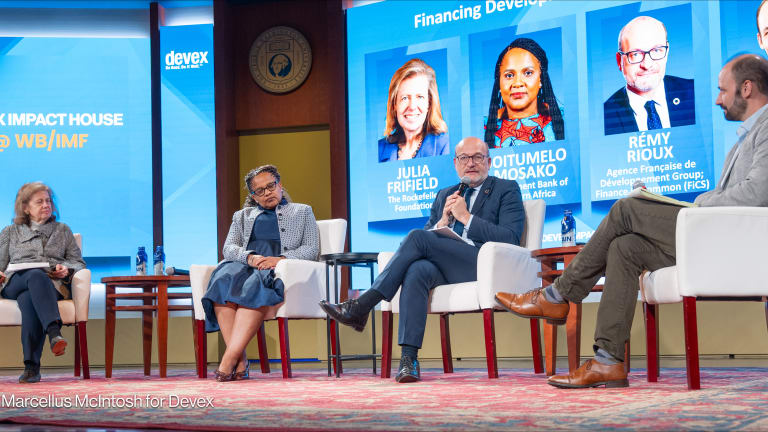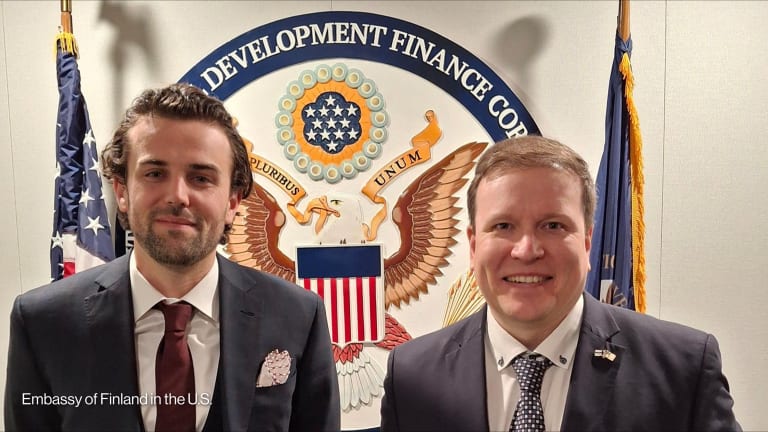Q&A: Suma Chakrabarti explains the need to 'push to get the private sector to do more'
Chakrabarti, the new chair of the Overseas Development Institute, tells Devex why development financing systems need to be rethought — and what it could take to make this happen.
NEW YORK — By now, it is well established that the COVID-19 pandemic has set back development progress and the Sustainable Development Goals by years, if not decades. But there may be novel solutions to reverse the trend. Suma Chakrabarti, the former head of the European Bank for Reconstruction and Development and the new chair of the Overseas Development Institute, is building a case for how to recover these losses. One part of the answer is revisiting the 2015 Addis Ababa Action Agenda, which, he said, has never fully been tried. “COVID presents a challenge, but also actually presents a political opportunity for our political leaders around the world — G-20 [Group of 20] and others — to rethink the financing of development, including particularly the financing of these multilateral banks that they own,” Chakrabarti said. “We need to move to a system which is more skills-based and recognize that these banks are complementary and not substitutes.They are very different, and they can do different things.” In a recent interview with Devex, Chakrabarti discussed his vision of “Addis II” and the role of the private sector and multilateral banks in redefining development financing and jump-starting progress. This conversation has been edited for length and clarity. There has been a lot of talk about how far off the SDGs are as a result of the pandemic. How hard is it to really measure how off track we are at this point and how much progress has been lost? The World Bank estimates something like 100 million people have fallen back into poverty. We also know that the fiscal situation in every country has gotten worse, because countries that were already short of revenue will have smaller economies and less domestic revenue. And governments will also become more indebted, and much of that debt will be external debt. So there's less money available for spending on public goods, which you need for the SDGs. There are some worrisome concerns around efforts to onshore production of goods. Trade flows in the last couple of decades really helped to be a major driver of economic development. But there's a bigger backlash going on now against trade, and that could be also another thing that slows down progress towards the SDGs. Genuinely, the situation has gotten worse from an already poor position. Do you think considering different solutions — or timelines on the SDGs, for example — are necessary, as a result of these setbacks? I do think COVID makes the challenge harder, but it doesn't necessarily change the solutions. When I was at the Addis Ababa new-financing-for-development conference, we had that very catchy slogan: “billions to trillions.” But it certainly was never going to be straightforward, and it could not be delivered by one source of funding alone. And if I looked at the numbers before COVID hit, I was actually particularly worried on a couple of fronts. I already thought that private financing wasn't flowing to the extent that we had all hoped, and aid budgets were under pressure in the West, particularly. So it wasn't exactly a rosy picture. COVID has has made this worse, and we've got to revisit not just the numbers and metrics, but also make the political case for why. I call it “Addis II” — you can call it what you like. It basically means that we've got to regather and really start looking for financing solutions. One of the things that constrains financing is an overly conservative approach by the shareholders of multilateral institutions like EBRD, World Bank, and others. And the shareholders are also overly conservative about the different skill sets of the different multilaterals. If you want the private sector to pick up more of the slack on the financing, you need to empower institutions like EBRD to do more than they're currently doing and in places where they're not currently doing it. Could you talk a bit more about what your Addis II vision might look like, in terms of financing development and the role of the private sector? It's one of the biggest disappointments post-Addis, because actually the private sector turned up in strength at the time. But it's still not anywhere near the scale of financing we need to see. I think that private finance generally is also quite conservative about its approach. They tend not to be as country-knowledgeable as you'd like them to be. And I think that multilateral banks who do have big country presence can do a job of actually fixing that information. “COVID presents a challenge, but also actually presents a political opportunity ... to rethink the financing of development.” --— Suma Chakrabarti, chair, Overseas Development Institute Private sector financiers — even if they care about the SDGs — they also want to make a profit. And here, the EBRD's type of approach is something that's very attractive. EBRD is looking for profitable projects that help private financiers, because they can take comfort in the analysis done by EBRD at the project level. So what we need is that same approach taken by others to give the private financiers more comfort. I think that's got to be part of the next work over the next 10 years: a big push to get the private sector to do more. How would you recommend private sector financing in development be focused? Are there particular regions or areas of work that come to mind? In terms of regions, the region that is furthest back from the SDG targets is sub-Saharan Africa. But it's also the region that is actually in some ways the most exciting, because it really wants to go forward with a private sector approach to development. The second question you ask is a good one. Jeez, what would you prioritize? I think the area that it really requires ramping up in a big way is sustainable infrastructure. I think we know the biggest impact of the climate Paris [Agreement] targets will be to do things completely differently on the infrastructure front. We know that's where the carbon emissions are coming from. Given the push away from multilateralism during the pandemic, by and large, what is your sense of the appetite for world leaders to work together on rethinking development financing, for example, and more investment? Right now, this conversation is tricky, because people are so inward-focusing. I think in some years past, we could have relied on some members of the G-7 [Group of Seven] or the U.S. and U.K. to take the leadership. I don't think that's happening right now. So our best bet is the U.N. [United Nations] secretary-general and his team, because they have the convening power to actually push this agenda. Maybe by early next year, when some of COVID’s immediate impact has unwound and we can see a way forward, they'll get some traction with the major, major countries. This is not a game where I'm expecting results tomorrow.
NEW YORK — By now, it is well established that the COVID-19 pandemic has set back development progress and the Sustainable Development Goals by years, if not decades. But there may be novel solutions to reverse the trend.
Suma Chakrabarti, the former head of the European Bank for Reconstruction and Development and the new chair of the Overseas Development Institute, is building a case for how to recover these losses. One part of the answer is revisiting the 2015 Addis Ababa Action Agenda, which, he said, has never fully been tried.
“COVID presents a challenge, but also actually presents a political opportunity for our political leaders around the world — G-20 [Group of 20] and others — to rethink the financing of development, including particularly the financing of these multilateral banks that they own,” Chakrabarti said. “We need to move to a system which is more skills-based and recognize that these banks are complementary and not substitutes.They are very different, and they can do different things.”
This story is forDevex Promembers
Unlock this story now with a 15-day free trial of Devex Pro.
With a Devex Pro subscription you'll get access to deeper analysis and exclusive insights from our reporters and analysts.
Start my free trialRequest a group subscription Printing articles to share with others is a breach of our terms and conditions and copyright policy. Please use the sharing options on the left side of the article. Devex Pro members may share up to 10 articles per month using the Pro share tool ( ).
Amy Lieberman is the U.N. Correspondent for Devex. She covers the United Nations and reports on global development and politics. Amy previously worked as a freelance reporter, covering the environment, human rights, immigration, and health across the U.S. and in more than 10 countries, including Colombia, Mexico, Nepal, and Cambodia. Her coverage has appeared in the Guardian, the Atlantic, Slate, and the Los Angeles Times. A native New Yorker, Amy received her master’s degree in politics and government from Columbia’s School of Journalism.








